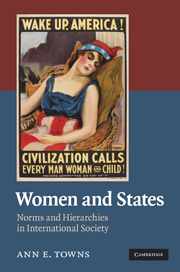Book contents
- Frontmatter
- Contents
- Tables
- Acknowledgments
- 1 Introduction
- 2 Constructivism and worldwide changes in state policy
- 3 A complex society of norms and social hierarchies
- 4 Excluding women in the society of civilized states
- 5 Women’s suffrage and the standards of civilization
- 6 National women’s policy bureaus and the standards of development
- 7 Legislature sex quotas and cultural rank
- 8 Conclusion
- Primary sources, by chapter
- Bibliography
- Index
2 - Constructivism and worldwide changes in state policy
Published online by Cambridge University Press: 05 October 2013
- Frontmatter
- Contents
- Tables
- Acknowledgments
- 1 Introduction
- 2 Constructivism and worldwide changes in state policy
- 3 A complex society of norms and social hierarchies
- 4 Excluding women in the society of civilized states
- 5 Women’s suffrage and the standards of civilization
- 6 National women’s policy bureaus and the standards of development
- 7 Legislature sex quotas and cultural rank
- 8 Conclusion
- Primary sources, by chapter
- Bibliography
- Index
Summary
Several heavyweights within the field of international relations, spanning the theoretical spectrum, have argued that constructivism is not “a theory” in the sense of offering explanations as empirically falsifiable causal claims. Kenneth Waltz recently argued that “constructivism is not a theory at all. If a so-called theory does not explain, it is not a theory.” Alexander Wendt likewise claims that “constructivism is not a theory of international politics . . . it looks at how actors are socially constructed, but does not tell us which actors to study or where they are constructed.”
Many constructivists would likely agree – constructivism is a set of ontological commitments and an approach to understanding international politics. If we look more closely at constructivist research in practice, however, a different picture emerges. On the question of changing state behavior on a worldwide scale, constructivist research does have explanatory aspirations. And these explanations do tell us which actors to study, where they are constructed, and even how and why change is brought about. In practice, there are constructivist theories, even in the narrow causal sense, about global changes in state policy.
- Type
- Chapter
- Information
- Women and StatesNorms and Hierarchies in International Society, pp. 17 - 41Publisher: Cambridge University PressPrint publication year: 2010



